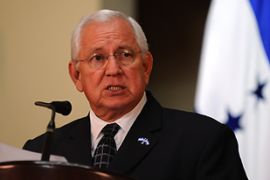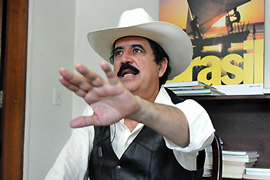Honduras de facto leader ‘to quit’
Panel overseeing deal to end crisis says Roberto Micheletti is set to resign.

“There is a lot that has not been worked out; the most important point is whether or not [Zelaya] the deposed president will be returned to power [before elections scheduled for November 29]. I can tell you that the way the numbers look, it does not look good for Zelaya.”
US urged
The commission’s announcement came hours after Zelaya, the ousted Honduran president, sent a letter to the US secretary of state asking why US officials have said that they will recognise forthcoming Honduran elections even if he is not reinstated beforehand.
Zelaya asked Hillary Clinton “to clarify to the Honduran people if the [US] position condemning the coup d’etat has been changed or modified”.
The letter was sent after Thomas Shannon, the senior US envoy to Latin America, told CNN en Espanol that the US will recognise the November 29 elections even if the Honduran congress votes against Zelaya’s return to power before the vote.
“Both leaders took a risk and put their trust in congress but, at the end of the day, the accord requires that both leaders accept its decision,” Shannon said.
Shannon’s comments appeared to mark a change in the US government’s stance as Washington has on several prior occasions called for Zelaya’s reinstatement as elected president.
Crisis deal
Zelaya, who was forced out of power in June, reached a US-brokered deal last week with the interim government led by Roberto Micheletti.
 |
| Zelaya has called on the US to clarify its stance on his attempt to being reinstated [AFP] |
Under the terms of the deal, the Honduran congress is to vote on whether to reinstate Zelaya before the presidential election on November 29.
But Zelaya indicated that a behind-the-scenes arrangement had been made with the Honduras congress to reinstate him.
“This [deal] signifies my return to power in the coming days, and peace for
Honduras,” he said soon after the agreement with the interim government was reached.
Zelaya’s comments, and the US approval of the deal, led many to think that congress was set to allow Zelaya to return to the presidency.
“I think it was sort of assumed that there was a deal with congress to reinstate him,” Dana Frank, a historian at the University of California, Santa Cruz, said.
“But the US negotiators may have underestimated the sheer nutso chaos of Honduran politics.”
US challenge
Juan Carlos Hidalgo, project co-ordinator for Latin America at the Washington-based Cato Institute, said he does not expect the Honduran congress to bend to US pressure on Zelaya’s planned return to power.
“If congress doesn’t reinstate Zelaya, it certainly will be a diplomatic embarrassment for the United States since they pressured so much for his reinstatement and even threatened to not recognise the election results,” Hidalgo said.
“But not recognising a popular vote was a dead-end road for the US and they knew it.”
Zelaya was forced from power on June 28, the same day that he planned to hold a non-binding referendum on changes to the constitution that had faced opposition in the country’s congress and supreme court.
Opponents of the ousted leader say that the public vote was intended to measure support for an extension to presidential term limits, in Zelaya’s favour.
Zelaya has dismissed those claims, saying that the vote was aimed at improving the lives of the poor in the nation of 7.6 million people.
The four-member verification panel overseeing the deal to end the political crisis is charged with ensuring that both Zelaya and the interim government recognise the November elections.
It is also tasked with making certain that the military is put under the command of electoral officials, in order to ensure the vote’s legitimacy.
Hilda Solis, the US labour secretary, and Ricardo Lagos, a former Chilean president, are on the panel along with Jorge Arturo Reina, a representative for Zelaya, and Arturo Corrales, who is representing the Honduran interim government.